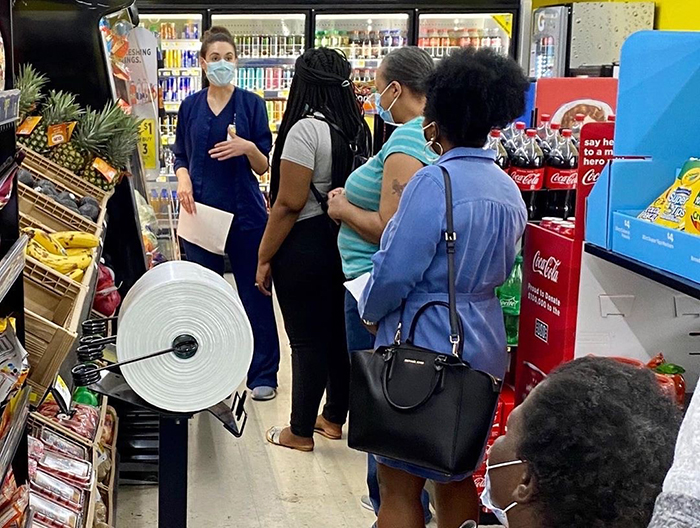Impact of Food Insecurity Intervention Program be Studied
Leslie Capo, Director of Information Services
 LSU Health New Orleans School of Medicine has awarded Dr. Tiffany Wesley Ardoin, Assistant
Professor of Clinical Medicine at its Baton Rouge branch campus, a Research Enhancement
Program grant to investigate the outcomes of an intervention program addressing food
insecurity. The FISH (Food Insecurity and Its Sequelae on Health) Study will measure
the effects of the Geaux Get Healthy Program on health. Geaux Get Healthy, a collaboration
between Our Lady of the Lake, LSU Health, HealthyBR and the American Heart Association
and funded by Healthy Blue, connects food-insecure individuals in North Baton Rouge
to nutrition education, access to affordable food and health resources.
LSU Health New Orleans School of Medicine has awarded Dr. Tiffany Wesley Ardoin, Assistant
Professor of Clinical Medicine at its Baton Rouge branch campus, a Research Enhancement
Program grant to investigate the outcomes of an intervention program addressing food
insecurity. The FISH (Food Insecurity and Its Sequelae on Health) Study will measure
the effects of the Geaux Get Healthy Program on health. Geaux Get Healthy, a collaboration
between Our Lady of the Lake, LSU Health, HealthyBR and the American Heart Association
and funded by Healthy Blue, connects food-insecure individuals in North Baton Rouge
to nutrition education, access to affordable food and health resources.
“We will look at food insecurity scores, surveys evaluating food utilization, depression scores, BMI, vital signs, A1C and lipid panels,” says Dr. Ardoin. “We want to see if this program successfully addresses food insecurity and as a result, improves metabolic health.”
Geaux Get Healthy is an eight-week program that provides education -- cooking classes and nutrition classes utilizing the AHA Healthy for Life Curriculum -- and grocery store tours, as well as access to nutritious foods through local partners like TopBox, Baton Roots, Greater Baton Rouge Food Bank.
“During my residency training, I was very eager to teach patients about a healthy diet in an effort to empower patients to improve their health,” notes Ardoin. “However, I quickly realized that many of my patients were unable to follow my recommendations because they required further education and/or did not have access to healthy foods in their community. That is when I discovered food insecurity and wanted to create a program, in partnership with HealthyBR and the American Heart Association, to improve food insecurity in East Baton Rouge Parish and hopefully have a bigger impact on our population's health.”
According to the Center for Planning Excellence, since the start of the pandemic, the number of food-insecure households in Louisiana has increased by 44%. They report that 22% of the households in Baton Rouge are food insecure, and 28% of households in North Baton Rouge are food insecure.
“We know that clinical care only impacts about 20% of a person's health, and the other
80% includes things like social determinants of health, including food insecurity,”
adds Ardoin. “Food insecurity is associated with many poor health outcomes including
obesity, cancer, heart disease, hyperlipidemia, diabetes and hypertension. Louisiana
ranks third in food insecurity. So, it isn't a surprise that we also are in the top
five states for deaths due to heart disease and stroke, and prevalence of diabetes
and obesity. My hope is that the Geaux Get Healthy Clinical Program positively impacts
the health of the community by addressing food insecurity. My goal for the FISH research
study is to see if we are really improving measurable health outcomes with an improvement
in food insecurity. As the Chinese proverb says, ‘Give a man a fish, and you feed
him for a day; teach a man how to fish, and you feed him for a lifetime.'”
